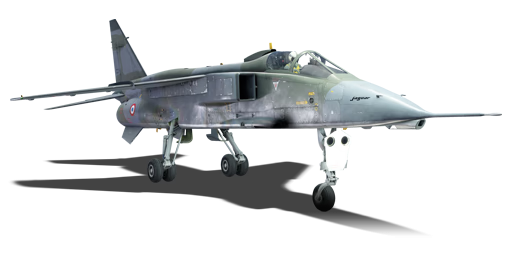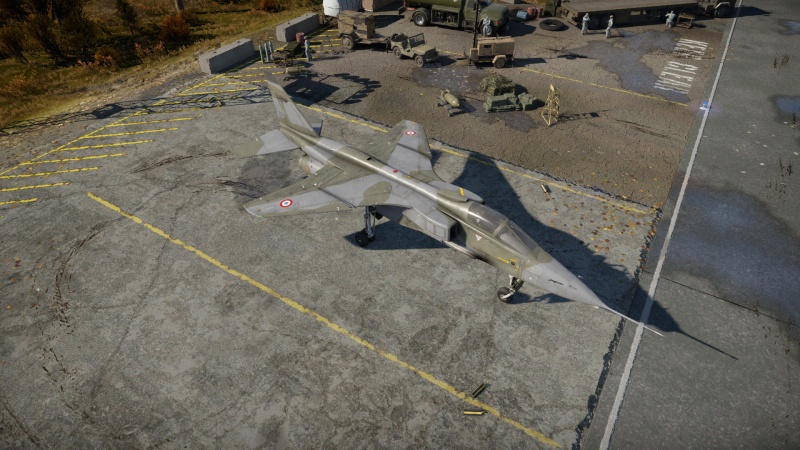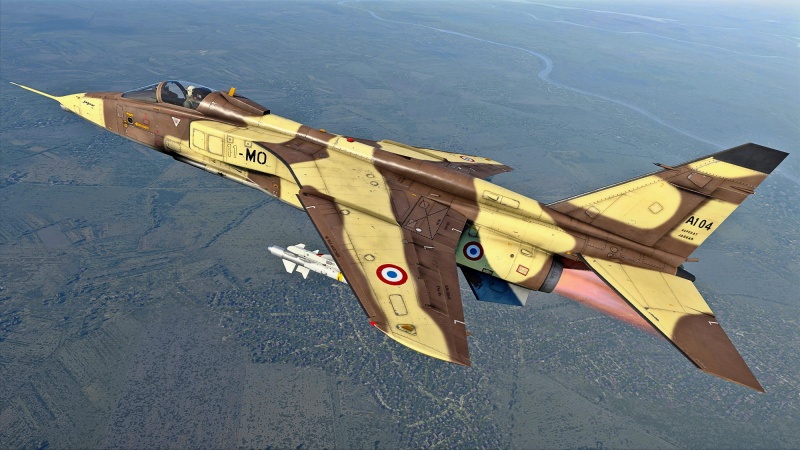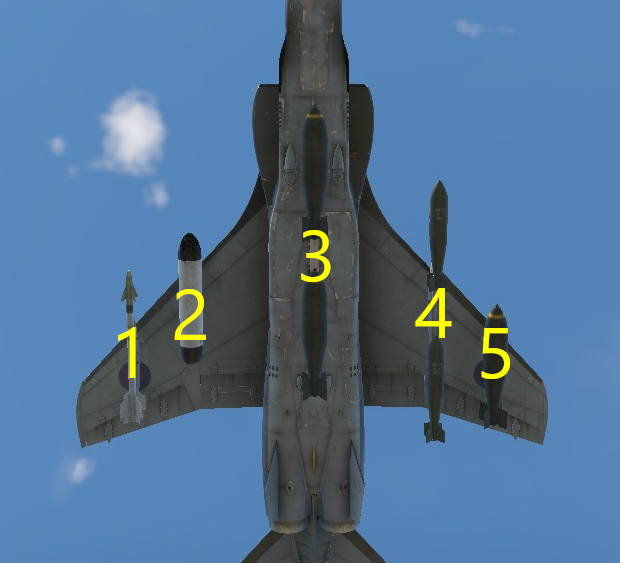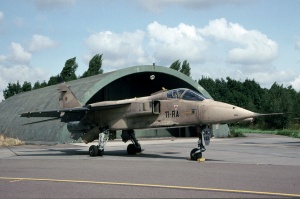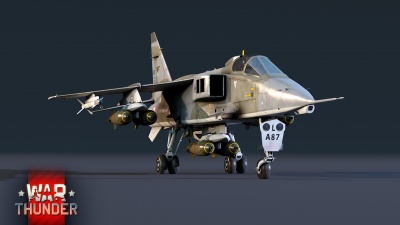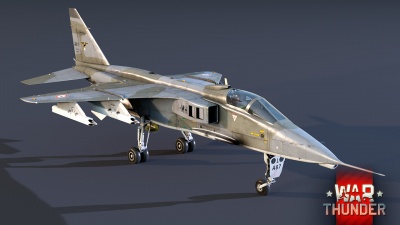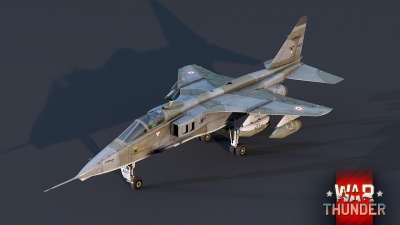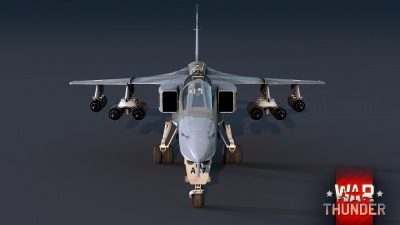Difference between revisions of "Jaguar A"
(→General info) (Tag: Visual edit) |
(→Suspended armament: Updated) |
||
| (6 intermediate revisions by 5 users not shown) | |||
| Line 11: | Line 11: | ||
== Description == | == Description == | ||
<!-- ''In the description, the first part should be about the history of and the creation and combat usage of the aircraft, as well as its key features. In the second part, tell the reader about the aircraft in the game. Insert a screenshot of the vehicle, so that if the novice player does not remember the vehicle by name, he will immediately understand what kind of vehicle the article is talking about.'' --> | <!-- ''In the description, the first part should be about the history of and the creation and combat usage of the aircraft, as well as its key features. In the second part, tell the reader about the aircraft in the game. Insert a screenshot of the vehicle, so that if the novice player does not remember the vehicle by name, he will immediately understand what kind of vehicle the article is talking about.'' --> | ||
| − | The ''' | + | The Jaguar programme began in the early 1960s, in response to a British requirement (Air Staff Target 362) and a French requirement (ECAT or École de Combat et d'Appui Tactique, "Tactical Combat Support Trainer") for a cheap, dual-role trainer and light attack aircraft to replace various obsolete subsonic aircraft filling that role. Cross-channel negotiations led Britain and France to form SEPECAT: ''Société Européenne de Production de l'Avion d'École de Combat et d'Appui Tactique'' – the "European company for the production of a combat trainer and tactical support aircraft". Almost all parts of the aircraft were jointly built by the two countries. For example, the powerplant was a partnership between Rolls-Royce and Turbomeca to develop the ''Adour'' afterburning turbofan engine, while the fuselage and wings were a partnership between Breguet and BAC, using the same basic configuration and an innovative French-designed landing gear and fuselage design, the Jaguar was built incorporating major elements of design from BAC, notably the wings and various control systems. In the end, the Jaguar program grew into more than just a trainer aircraft, and saw great export sales to foreign countries as a trainer, bomber, strike aircraft, and anti-shipping attacker. The Jaguar A variant was the single-seat, all-weather tactical strike and ground-attack fighter version for the French Air Force, with two prototypes and 160 production aircraft built. |
| + | |||
| + | The '''{{Specs|name}}''', introduced in [[Update "Raining Fire"]], is a deadly attacker for its battle rating available in the French tech tree. The Jaguar has high wing loading and suffers from greatly decreased manoeuvrability and speed when fully loaded with ordnance, however, it will often not be used in such a case in-game, instead being utilized as a support fighter in dedicated air battles with its abundant countermeasures and [[Matra R550 Magic 1|R.550 Magic 1]] missiles combined with its nimble handling when unburdened. However, combined battles is where the Jaguar A really shines, being able to use a wide array of guided and unguided ordnance, chief of which are the powerful [[BGL-400 (400 kg)|BGL-400]]/[[BGL-1000 (970 kg)|1000]] series laser-guided bombs and [[AS-30L Nord]] laser-guided missiles. | ||
== General info == | == General info == | ||
| Line 17: | Line 19: | ||
{{Specs-Avia-Flight}} | {{Specs-Avia-Flight}} | ||
<!-- ''Describe how the aircraft behaves in the air. Speed, manoeuvrability, acceleration and allowable loads - these are the most important characteristics of the vehicle.'' --> | <!-- ''Describe how the aircraft behaves in the air. Speed, manoeuvrability, acceleration and allowable loads - these are the most important characteristics of the vehicle.'' --> | ||
| − | The SEPECAT Jaguar is a relatively small aircraft, with a relatively small wing surface area, yet it boasts two jet engines, each yielding nearly two tons of wet thrust. These characteristics give the Jaguar | + | The SEPECAT Jaguar is a relatively small aircraft, with a relatively small wing surface area, yet it boasts two jet engines, each yielding nearly two tons of wet thrust. These characteristics give the Jaguar high agility and responsiveness, being able to engage turnfights if necessary. On the other hand, this small frame makes the Jaguar turn into a brick when loaded with bombs, even becoming so heavy it becomes very hard to take-off. The wings are of a swept design, and the Jaguar loses energy while turning only moderately, not being a BnZ fighter, but not being as bad as a [[Mirage IIIC]] or a [[J35D]] Draken. Overall it is a quite average fighter, while not loaded. |
{| class="wikitable" style="text-align:center" width="70%" | {| class="wikitable" style="text-align:center" width="70%" | ||
| Line 50: | Line 52: | ||
{| class="wikitable" style="text-align:center" width="50%" | {| class="wikitable" style="text-align:center" width="50%" | ||
|- | |- | ||
| − | ! colspan=" | + | ! colspan="7" | Limits |
|- | |- | ||
! rowspan="2" | Wings (km/h) | ! rowspan="2" | Wings (km/h) | ||
| Line 56: | Line 58: | ||
! colspan="3" | Flaps (km/h) | ! colspan="3" | Flaps (km/h) | ||
! colspan="2" | Max Static G | ! colspan="2" | Max Static G | ||
| − | |||
|- | |- | ||
! Combat !! Take-off !! Landing !! + !! - | ! Combat !! Take-off !! Landing !! + !! - | ||
|- | |- | ||
| 1,273 <!-- {{Specs|destruction|body}} --> || {{Specs|destruction|gear}} || 926 || 525 || 410 || ~12 || ~6 | | 1,273 <!-- {{Specs|destruction|body}} --> || {{Specs|destruction|gear}} || 926 || 525 || 410 || ~12 || ~6 | ||
| − | |||
|- | |- | ||
|} | |} | ||
| Line 149: | Line 149: | ||
|- | |- | ||
! !! width="9%" | 1 !! width="9%" | 2 !! width="9%" | 3 !! width="9%" | 4 !! width="9%" | 5 | ! !! width="9%" | 1 !! width="9%" | 2 !! width="9%" | 3 !! width="9%" | 4 !! width="9%" | 5 | ||
| − | | rowspan=" | + | | rowspan="14" width="30%" | <div class="ttx-image">[[File:Hardpoints_Jaguar_GR.1.png]]</div> |
|- | |- | ||
! [[SAMP Type 25 (250 kg)|250 kg SAMP Type 25]] bombs | ! [[SAMP Type 25 (250 kg)|250 kg SAMP Type 25]] bombs | ||
| Line 186: | Line 186: | ||
! ATLIS II targeting pod | ! ATLIS II targeting pod | ||
| || || 1* || || | | || || 1* || || | ||
| + | |- | ||
| + | ! 1,200 l drop tanks | ||
| + | | || 1 || 1 || 1 || | ||
|- | |- | ||
| colspan="7" | * The ATLIS II pod must be carried when equipping guided air-to-ground ordnance | | colspan="7" | * The ATLIS II pod must be carried when equipping guided air-to-ground ordnance | ||
| Line 194: | Line 197: | ||
{{Navigation-First-Simple-Line}} | {{Navigation-First-Simple-Line}} | ||
| − | * | + | * 3 x 1,200 l drop tanks |
* 2 x Matra R550 Magic 1 missiles | * 2 x Matra R550 Magic 1 missiles | ||
* 11 x 250 kg SAMP Type 25 bombs (2,750 kg total) | * 11 x 250 kg SAMP Type 25 bombs (2,750 kg total) | ||
| Line 209: | Line 212: | ||
{{Navigation-End}} | {{Navigation-End}} | ||
| − | The sets of bombs are the heaviest ordnances for the aircraft, but ensure a good supply of CAS support capability, even though | + | The sets of bombs are the heaviest ordnances for the aircraft, but ensure a good supply of CAS support capability, even though bombing runs in combined battles are risky at these BRs. |
| − | The most exotic loadout | + | The most exotic loadout mounted by the Jaguar A is the TBA Multi-Dart 100 AB rocket. This rocket is a hypersonic, sub-munition-carrying vessel, with each rocket carrying six darts, and reaching 1,400 m/s, or Mach 4.2. Each dart is in fact a small kinetic penetrator, each being able to penetrate 80 mm of flat armour, and relying only on fragmentation of armour for post-penetration damage. While these darts cannot pierce the front (or even side) hull of a modern MBT, it will pierce its roof without problems, and the rocket's speed and number of darts gives the possibility of top attacks from a safe distance with extreme precision when used alongside [[Ballistic Computer|CCIP]]. |
== Usage in battles == | == Usage in battles == | ||
<!-- ''Describe the tactics of playing in the aircraft, the features of using aircraft in a team and advice on tactics. Refrain from creating a "guide" - do not impose a single point of view, but instead, give the reader food for thought. Examine the most dangerous enemies and give recommendations on fighting them. If necessary, note the specifics of the game in different modes (AB, RB, SB).'' --> | <!-- ''Describe the tactics of playing in the aircraft, the features of using aircraft in a team and advice on tactics. Refrain from creating a "guide" - do not impose a single point of view, but instead, give the reader food for thought. Examine the most dangerous enemies and give recommendations on fighting them. If necessary, note the specifics of the game in different modes (AB, RB, SB).'' --> | ||
| − | The Jaguar A's only air-to-air missiles are locked as a rank 4 modification. The entirety of its opposition will be carrying both IR and semi-active radar missiles. Once these missiles are researched, the Jaguar becomes a force to be reckoned with, and it | + | The Jaguar A's only air-to-air missiles are locked as a rank 4 modification. The entirety of its opposition will be carrying both IR and semi-active radar missiles, although IR missiles will be the main source of induced headaches. Once these missiles are researched, the Jaguar becomes a force to be reckoned with, and it becomes possible to engage enemy aircraft who are preoccupied in a dogfight or happen to fly in front of you. The bomb/rocket load of the Jaguar A is decent, and bombing bases and key targets is definitely a good way to acquire Research Points and Silver Lions. Carrying a hybrid air-to-air and air-to-ground load is a good compromise, retaining adequate ground pounding capabilities while acquiring self-defence capabilities. |
| − | It is a good tactic to let pure fighters go in front, | + | It is a good tactic to let pure fighters go in front. You can try to gain altitude to have some energy as a safety net in case someone tries to engage you in a dogfight, or stay low to sneak past enemy aircraft to strike ground targets or an enemy base. It is to be noted that if one chooses to do the former, on most maps contrails will form at approximately 5800 meters in altitude. As such, if climbing, to not give your position away staying just below this altitude may be preferable. That way, the Jaguar will not be directly on the front lines, and will be able to expend its bomb load and attempt to help friendly fighters with its missiles. The Jaguar cannot face aircraft such as a MiG-21, F-5, Mirage IIIC or even a Phantom II and be expected to win if its opponents play their cards right. Overall, the aircraft fares better as a support aircraft. |
| − | In Combined battles, many CAS options are available | + | In Combined battles, many CAS options are available, be it the SAMP bombs, SNEB rockets, or Multi-Dart rockets. Remaining at a safe distance and avoiding incoming missiles while selecting a target, then pointing it swiftly for a top attack with one or more Multi-Dart rockets seems to be an adequate usage of these weapons. It can be decided to abandon the air-to-air missiles to carry more ordnance, that is a choice of attack paradigm each player must make. The player can also choose to equip the guided bombs and targeting pod, to accurately target enemy anti-aircraft vehicles from a safe distance or to take care of enemy players holed up in hard-to-take-out positions, aiding your teammates. |
=== Pros and cons === | === Pros and cons === | ||
| Line 229: | Line 232: | ||
* Small frame, hard to hit with guns | * Small frame, hard to hit with guns | ||
* Nimble and agile while not loaded | * Nimble and agile while not loaded | ||
| − | * Carries two | + | * Carries two highly capable [[Matra R550 Magic 1]] missiles |
| − | * Carries an exotic weapon for CAS, which players are not used to | + | * Carries an exotic weapon for CAS, which players are not used to facing |
| − | |||
* Has a [[HUD#410SUM1|Head-Up Display]] in the cockpit which provides flight information and weapon aiming functionality | * Has a [[HUD#410SUM1|Head-Up Display]] in the cockpit which provides flight information and weapon aiming functionality | ||
* Very effective [[TBA Multi-Dart 100 AB]] rockets containing an array of six sub-calibre darts, each a small kinetic penetrator capable of piercing 80 mm of armour | * Very effective [[TBA Multi-Dart 100 AB]] rockets containing an array of six sub-calibre darts, each a small kinetic penetrator capable of piercing 80 mm of armour | ||
* Has a very large number of countermeasures, giving it very good and extended defensive capabilities | * Has a very large number of countermeasures, giving it very good and extended defensive capabilities | ||
| + | * Has the ability to use guided bombs, letting the aircraft stay at a safe distance from enemy anti-aircraft vehicles in Combined Battles. | ||
'''Cons:''' | '''Cons:''' | ||
| − | * Mediocre speed | + | * Mediocre speed |
| − | * | + | * Punitive modification grind, especially for the [[Matra R550 Magic 1]]s at Tier 4. |
* Basically a barely flying anvil when fully loaded with bombs | * Basically a barely flying anvil when fully loaded with bombs | ||
| − | |||
* No radar (and thus no radar guided missiles) | * No radar (and thus no radar guided missiles) | ||
| + | * Bleeds speed excessively while maneuvering, often making dogfighting a challenge | ||
== History == | == History == | ||
Latest revision as of 20:54, 20 June 2024
| This page is about the French strike aircraft Jaguar A. For other versions, see Jaguar (Family). |
Contents
Description
The Jaguar programme began in the early 1960s, in response to a British requirement (Air Staff Target 362) and a French requirement (ECAT or École de Combat et d'Appui Tactique, "Tactical Combat Support Trainer") for a cheap, dual-role trainer and light attack aircraft to replace various obsolete subsonic aircraft filling that role. Cross-channel negotiations led Britain and France to form SEPECAT: Société Européenne de Production de l'Avion d'École de Combat et d'Appui Tactique – the "European company for the production of a combat trainer and tactical support aircraft". Almost all parts of the aircraft were jointly built by the two countries. For example, the powerplant was a partnership between Rolls-Royce and Turbomeca to develop the Adour afterburning turbofan engine, while the fuselage and wings were a partnership between Breguet and BAC, using the same basic configuration and an innovative French-designed landing gear and fuselage design, the Jaguar was built incorporating major elements of design from BAC, notably the wings and various control systems. In the end, the Jaguar program grew into more than just a trainer aircraft, and saw great export sales to foreign countries as a trainer, bomber, strike aircraft, and anti-shipping attacker. The Jaguar A variant was the single-seat, all-weather tactical strike and ground-attack fighter version for the French Air Force, with two prototypes and 160 production aircraft built.
The Jaguar A, introduced in Update "Raining Fire", is a deadly attacker for its battle rating available in the French tech tree. The Jaguar has high wing loading and suffers from greatly decreased manoeuvrability and speed when fully loaded with ordnance, however, it will often not be used in such a case in-game, instead being utilized as a support fighter in dedicated air battles with its abundant countermeasures and R.550 Magic 1 missiles combined with its nimble handling when unburdened. However, combined battles is where the Jaguar A really shines, being able to use a wide array of guided and unguided ordnance, chief of which are the powerful BGL-400/1000 series laser-guided bombs and AS-30L Nord laser-guided missiles.
General info
Flight performance
The SEPECAT Jaguar is a relatively small aircraft, with a relatively small wing surface area, yet it boasts two jet engines, each yielding nearly two tons of wet thrust. These characteristics give the Jaguar high agility and responsiveness, being able to engage turnfights if necessary. On the other hand, this small frame makes the Jaguar turn into a brick when loaded with bombs, even becoming so heavy it becomes very hard to take-off. The wings are of a swept design, and the Jaguar loses energy while turning only moderately, not being a BnZ fighter, but not being as bad as a Mirage IIIC or a J35D Draken. Overall it is a quite average fighter, while not loaded.
| Characteristics | Max Speed (km/h at 10,668 m) |
Max altitude (metres) |
Turn time (seconds) |
Rate of climb (metres/second) |
Take-off run (metres) | |||
|---|---|---|---|---|---|---|---|---|
| AB | RB | AB | RB | AB | RB | |||
| Stock | 1,464 | 1,453 | 13716 | 31.8 | 32.4 | 74.6 | 67.7 | 850 |
| Upgraded | 1,524 | 1,490 | 28.6 | 30.0 | 108.7 | 90.0 | ||
Details
| Features | |||||
|---|---|---|---|---|---|
| Combat flaps | Take-off flaps | Landing flaps | Air brakes | Arrestor gear | Drogue chute |
| ✓ | ✓ | ✓ | ✓ | ✓ | ✓ |
| Limits | ||||||
|---|---|---|---|---|---|---|
| Wings (km/h) | Gear (km/h) | Flaps (km/h) | Max Static G | |||
| Combat | Take-off | Landing | + | - | ||
| 1,273 | 481 | 926 | 525 | 410 | ~12 | ~6 |
| Optimal velocities (km/h) | |||
|---|---|---|---|
| Ailerons | Rudder | Elevators | Radiator |
| < 650 | < 600 | < 720 | N/A |
Engine performance
| Engine | Aircraft mass | |||||||
|---|---|---|---|---|---|---|---|---|
| Engine name | Number | Basic mass | Wing loading (full fuel) | |||||
| Rolls-Royce Turbomeca Limited Adour Mk.102 | 2 | 7,616 kg | 453 kg/m2 | |||||
| Engine characteristics | Mass with fuel (no weapons load) | Max Takeoff Weight | ||||||
| Weight (each) | Type | 15m fuel | 20m fuel | 30m fuel | 45m fuel | 53m fuel | ||
| 709 kg | Afterburning low-bypass turbofan | 8,592 kg | 8,838 kg | 9,448 kg | 10,365 kg | 10,869 kg | 13,500 kg | |
| Maximum engine thrust @ 0 m (RB/SB) | Thrust to weight ratio @ 0 m (WEP) | |||||||
| Condition | 100% | WEP | 15m fuel | 20m fuel | 30m fuel | 45m fuel | 53m fuel | MTOW |
| Stationary | 1,998 kgf | 3,094 kgf | 0.72 | 0.70 | 0.65 | 0.60 | 0.57 | 0.46 |
| Optimal | 2,242 kgf (200 km/h) |
3,307 kgf (200 km/h) |
0.77 | 0.75 | 0.70 | 0.64 | 0.61 | 0.49 |
Survivability and armour
The Jaguar A has no armour plating or armoured glass. The entire wings of the Jaguar A are made up of fuel tanks, along with most of the upper fuselage, with flight controls being exposed in the "spine" of the aircraft. The two engines take up a small amount of room in the very rear of the fuselage.
Modifications and economy
Armaments
| Ballistic Computer | |||
|---|---|---|---|
| CCIP (Guns) | CCIP (Rockets) | CCIP (Bombs) | CCRP (Bombs) |
| |
|
|
|
Offensive armament
The Jaguar A is armed with:
- A choice between two presets:
- 2 x 30 mm DEFA 553 cannons, belly-mounted (150 rpg = 300 total)
- 2 x 30 mm DEFA 553 cannons + 252 x countermeasures
Suspended armament
The Jaguar A can be outfitted with the following ordnance:
| 1 | 2 | 3 | 4 | 5 | ||
|---|---|---|---|---|---|---|
| 250 kg SAMP Type 25 bombs | 1 | 3 | 3 | 3 | 1 | |
| 250 kg SAMP Type 25 200 bombs | 1 | 3 | 3 | 3 | 1 | |
| 400 kg SAMP Type 21 bombs | 1 | 2 | 2 | 2 | 1 | |
| 400 kg SAMP Type 21 200 bombs | 1 | 2 | 2 | 2 | 1 | |
| 400 kg BGL-400 bombs | 1* | 1* | ||||
| 970 kg BGL-1000 bombs | 1* | 1* | ||||
| SNEB type 23 rockets | 18, 36 | 36, 36 | 36, 36 | 18, 36 | ||
| TBA ECC rockets | 4 | 4 | 4 | 4 | ||
| TBA Multi-Dart 100 AB rockets | 4 | 4 | 4 | 4 | ||
| AS-30L Nord missiles | 1* | 1* | ||||
| Matra R550 Magic 1 missiles | 1 | 1 | ||||
| ATLIS II targeting pod | 1* | |||||
| 1,200 l drop tanks | 1 | 1 | 1 | |||
| * The ATLIS II pod must be carried when equipping guided air-to-ground ordnance | ||||||
| Default weapon presets | |
|---|---|
| |
The sets of bombs are the heaviest ordnances for the aircraft, but ensure a good supply of CAS support capability, even though bombing runs in combined battles are risky at these BRs.
The most exotic loadout mounted by the Jaguar A is the TBA Multi-Dart 100 AB rocket. This rocket is a hypersonic, sub-munition-carrying vessel, with each rocket carrying six darts, and reaching 1,400 m/s, or Mach 4.2. Each dart is in fact a small kinetic penetrator, each being able to penetrate 80 mm of flat armour, and relying only on fragmentation of armour for post-penetration damage. While these darts cannot pierce the front (or even side) hull of a modern MBT, it will pierce its roof without problems, and the rocket's speed and number of darts gives the possibility of top attacks from a safe distance with extreme precision when used alongside CCIP.
Usage in battles
The Jaguar A's only air-to-air missiles are locked as a rank 4 modification. The entirety of its opposition will be carrying both IR and semi-active radar missiles, although IR missiles will be the main source of induced headaches. Once these missiles are researched, the Jaguar becomes a force to be reckoned with, and it becomes possible to engage enemy aircraft who are preoccupied in a dogfight or happen to fly in front of you. The bomb/rocket load of the Jaguar A is decent, and bombing bases and key targets is definitely a good way to acquire Research Points and Silver Lions. Carrying a hybrid air-to-air and air-to-ground load is a good compromise, retaining adequate ground pounding capabilities while acquiring self-defence capabilities.
It is a good tactic to let pure fighters go in front. You can try to gain altitude to have some energy as a safety net in case someone tries to engage you in a dogfight, or stay low to sneak past enemy aircraft to strike ground targets or an enemy base. It is to be noted that if one chooses to do the former, on most maps contrails will form at approximately 5800 meters in altitude. As such, if climbing, to not give your position away staying just below this altitude may be preferable. That way, the Jaguar will not be directly on the front lines, and will be able to expend its bomb load and attempt to help friendly fighters with its missiles. The Jaguar cannot face aircraft such as a MiG-21, F-5, Mirage IIIC or even a Phantom II and be expected to win if its opponents play their cards right. Overall, the aircraft fares better as a support aircraft.
In Combined battles, many CAS options are available, be it the SAMP bombs, SNEB rockets, or Multi-Dart rockets. Remaining at a safe distance and avoiding incoming missiles while selecting a target, then pointing it swiftly for a top attack with one or more Multi-Dart rockets seems to be an adequate usage of these weapons. It can be decided to abandon the air-to-air missiles to carry more ordnance, that is a choice of attack paradigm each player must make. The player can also choose to equip the guided bombs and targeting pod, to accurately target enemy anti-aircraft vehicles from a safe distance or to take care of enemy players holed up in hard-to-take-out positions, aiding your teammates.
Pros and cons
Pros:
- Small frame, hard to hit with guns
- Nimble and agile while not loaded
- Carries two highly capable Matra R550 Magic 1 missiles
- Carries an exotic weapon for CAS, which players are not used to facing
- Has a Head-Up Display in the cockpit which provides flight information and weapon aiming functionality
- Very effective TBA Multi-Dart 100 AB rockets containing an array of six sub-calibre darts, each a small kinetic penetrator capable of piercing 80 mm of armour
- Has a very large number of countermeasures, giving it very good and extended defensive capabilities
- Has the ability to use guided bombs, letting the aircraft stay at a safe distance from enemy anti-aircraft vehicles in Combined Battles.
Cons:
- Mediocre speed
- Punitive modification grind, especially for the Matra R550 Magic 1s at Tier 4.
- Basically a barely flying anvil when fully loaded with bombs
- No radar (and thus no radar guided missiles)
- Bleeds speed excessively while maneuvering, often making dogfighting a challenge
History
The Jaguar A was the French variant of the SEPECAT Jaguar, developed jointly by France and the United Kingdom. The first prototype flew in late 1968, fitted with the Adour engine. The aircraft later flew at the Paris Air Show in 1969, and the further developed Jaguar A prototype, improved and designed for French service, flew in March of that year. After the commencement of production, the French Air Service accepted the first Jaguar A in December 1973, one of an eventual 160 Jaguar A aircraft that would serve with the Air Service. As well, the Air Ministry procured 40 additional Jaguar E trainers, to help train pilots for the Jaguar A.
The aircraft was able to carry an AN-52 nuclear bomb; however, the aircraft never served with the French strategic nuclear force, as the role had been taken by the Mirage IV. The aircraft was immediately pressed into service defending national interests in Africa, a mission sometimes referred to as "Jaguar Diplomacy". Thus, Jaguars had their combat debut fighting rebels in Mauritania. The aircraft also flew in the Chad-Libya conflict and in the Central African Republic. During its time in African-theatre service, the Jaguar gained a reputation for being a highly effective ground attacker; Libyan forces frequently tried to sabotage the Jaguars stationed in Chad due to their effectiveness against ground targets.
Later on, Jaguars served in the Gulf War and the 1999 Kosovo conflict. The aircraft flew 615 sorties in the Gulf War, and one aircraft was lost to an Iraqi SAM. The plane was frequently used to destroy Iraqi convoys, naval vessels and Scud missile sites. The aircraft also performed a valuable reconnaissance role, providing aerial photography and intelligence for the NATO forces. The Jaguars went on to serve until 2005 when they were replaced in the ground-attack role by the Dassault Rafale.
Devblog
In the early 1960s, both Great Britain and France were looking into procuring a new jet trainer for their respective air forces. Despite differences in specifications and requirements, the two nations were united in their pursuit for such a new aircraft, thus leading to an agreement being signed in 1965 which would kick off development of what would eventually become the Jaguar.
The Jaguar was being developed under a specially formed consortium of British and French aviation companies, namely Bréguet and BAC, called SEPECAT (you can look up what the acronym stands for on your own - we promise you won't be disappointed though). Continuing with the theme of joint projects, Rolls-Royce and Turbomeca also joined forces to develop a new turbofan engine - the Adour - for the new aircraft.
The first of eight prototypes of the Jaguar successfully conducted its maiden flight in September of 1968. Following the conclusion of further testing, the Jaguar went into production in two major variants - the Jaguar A being the modification used by the French Air Force and the Jaguar S (Jaguar GR.1) being the variant employed by the RAF. Both variants of the machine entered production in the early 1970s, with the first production models being delivered in 1973/'74.
The Jaguar primarily served with France and Great Britain, most notably distinguishing itself in action during the Gulf War of the 1990s. However, Ecuador, Nigeria and Oman also operated modifications of the Jaguar, while India still operates the Jaguar to this day. In total over 540 SEPECAT Jaguars were built.
Media
- Skins
- Images
- Jaguar A Devblog Images
- Videos
See also
External links
| SEPECAT | |
|---|---|
| Jet fighters | Jaguar A · Jaguar E · Jaguar GR.1 · Jaguar GR.1A · Jaguar IS* |
| SEPECAT was a joint venture between BAC (later BAe) and Bréguet (later merged with Dassault). Production were split between the two manufacturers. *Built by BAe and Hindustan Aeronautics Limited (HAL). | |
| France jet aircraft | |
|---|---|
| Fighters | M.D.450B Ouragan · M.D.450B Barougan · M.D.452 IIA · M.D.452 IIC · Mystere IVA · Super Mystere B2 |
| ▄F-86K · ▄F-100D · ▄F-8E(FN) | |
| Mirage IIIC · Mirage IIIE · Milan · Mirage 5F · Mirage 2000C-S4 · Mirage 2000C-S5 · Mirage 2000-5F · Mirage 4000 | |
| Mirage F1C · Mirage F1C-200 · Mirage F1CT | |
| Strike aircraft | ▄F-84F · F-84F IAF · ▄F-84G-26-RE |
| Etendard IVM · Super Etendard · Alpha Jet E | |
| Jaguar A · Jaguar E · Mirage 2000D-R1 | |
| Bombers | S.O.4050 Vautour IIA · Vautour IIA IDF/AF · S.O.4050 Vautour IIB · S.O.4050 Vautour IIN · S.O.4050 Vautour IIN (late) |
| Belgium | ▄Meteor F Mk.8 · ▄Mirage 5BA · ▄F-104G · ▄F-16A · ▄F-16AM |
| Netherlands | ▄Sea Hawk Mk.50 · ◘Hunter F.6 |


